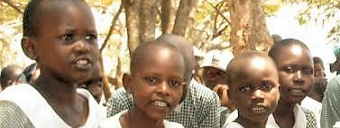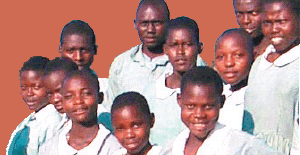|
From the outset of the school development
programme, we agreed with the Got Matar Community that it
was terribly important that the school should be open to
children from the poorest families, and particularly to
orphans. This led to the creation of
a Bursary Committee to select deserving candidates and to
administer a bursary scheme. Candidates should have good
passes in the Secondary School Entrance Examination, but
come from families who would be unable to fund their
attendance at the school without some assistance. The
Committee also seeks to maintain an equal gender balance in
its selection of awardees. |
|
Although secondary school education has
officially been “free” since January 2008, pupils have to
meet the costs of uniforms, shoes, PTA fees, the costs of
hiring locally recruited teachers, school lunches and
national exam fees. The total cost of these “extras”
for 4 years’ attendance is now estimated at Euro 490
(or £420 or US$ 725) – an average of about
Euro 125 per year (or equivalent). |
 |
January 2010
As of January 2010, there will be 173 bursary
awardees at the school out of the 600 pupils expected to be
in attendance. Of these, 65 will be in their final year in
Form IV, 64 in Form III, 24 in Form II and 20 will be new
pupils in Form I.The bursary
programme has unfortunately been poorly sponsored, in spite
of the fact that it offers a very low cost means of enabling
the poorest children to attend the new school. With only
about 20 children sponsored by donors, we have had to draw
on other funds to meet the costs of the other bursaries.
However we had to cut down drastically on the number of new
grants after the second year on grounds of affordability, as
the bursary programme was competing for funds available for
school construction.
We have now agreed with the Community
Development Group to arrive at an equilibrium of 20 new
bursaries per year from now on. This would mean a total
of about 80 bursary holders out of the 600 pupils in the
school from 2011 onwards, or about half the desirable
number, given the extreme poverty in the area. |
It would be wonderful if more bursary
sponsors would come forward so as to enable the school
to increase the number of pupils from very poor families.
But the Community also acknowledges the need to develop
local sources of funding for bursaries so as to reduce donor
dependence. The Community is
strongly interested in creating local income-generating
enterprises that could also be used to train school leavers
in business management and technical skills. Ideas being
examined include making school furniture, sewing school
uniforms, growing vegetables, making bricks, and developing
local handicrafts for export markets. Ideally, if funds are
available, they should go to setting up these enterprises
rather than directly to sponsoring bursaries. The Community
is, however, caught up in a chicken-and-egg situation, and
will not be able to put bursaries on a sustainable basis
until it secures funding for investment in income generating
activities. We urge friends of Got
Matar to assist on each of these fronts. We would,
therefore, welcome expressions of interest in both direct
funding of bursaries and in financing income-generating
activities. |
How you can help
The best way to help is to commit to pay Euro 125 (£115
or US185)
per year for 4 years to support a Bursary which will
guarantee schooling for a boy or girl for the full secondary
school course. Payments can be made on an annual or more
frequent basis or as a lump sum to cover the full four
years. Smaller commitments to the Bursary Fund are also, of
course, most welcome. The Committee will provide you with
the name of the individual awardee and you would have the
option of receiving end-of-term reports and of entering into
one-to-one correspondence.Donors
are strongly discouraged from making any direct payments to
“their” awardee or his/her family. Similarly, awardees are
obliged not to write “begging” letters to their sponsors, at
the risk of losing their bursary. This is essential to avoid
inducing dependencies and creating jealousies within the
community and school.
Payments may be made via the two NGOs
supporting Got Matar – SONIA in Italy and PEAS
in UK, who will forward donations and donor details to the
Got Matar Community Development Group. Forms are
downloadable from the Donations page
here. Please write on
the form “For Got Matar Bursary Fund".
For enquiries, please contact:
Vanda Altarelli
([email protected])
Andrew MacMillan ([email protected])
or telephone 0039 0564507930. |

